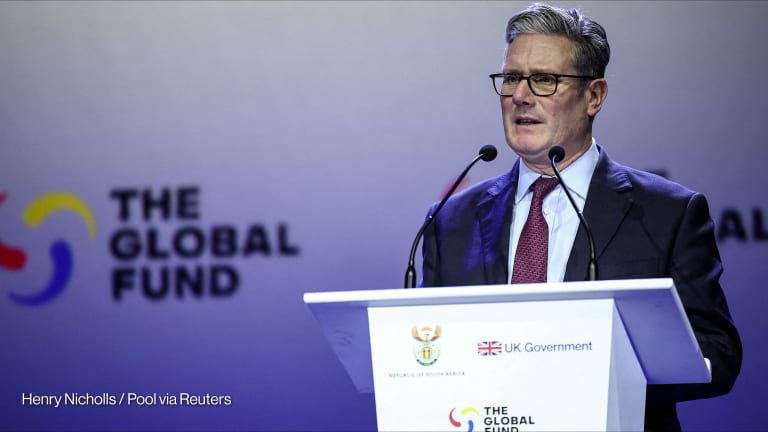Interactive: New lessons from DFID disbursement data
A new analysis of DFID's payment data shows a decline in disbursements between 2017-2018, and a continuing decrease in the number of implementing partners supporting the U.K. aid program.
CANBERRA — The United Kingdom’s Department for International Development witnessed a decline in disbursements between 2017-2018 and had fewer implementers supporting the aid program, analysis by Devex shows. A total of £8.6 billion ($11.13 billion) was disbursed in 2018 — a 7% decline from 2017 which recorded a peak of £9.2 billion in disbursements for the year. The number of DFID implementing partners also steadily declined, from 2,496 partners in 2014 to 1,259 partners in 2018. With a report last year showing a decrease in DFID contracts awarded to small- and medium-sized enterprises, these statistics signal an increasing reliance on select partners to support the delivery of the U.K. aid program. Implementers of DFID’s programs include academic institutions; foreign aid or government entities; multilateral and supranational organizations; NGOs and CSOs; private sector organizations; and U.K. government entities. DFID releases a monthly public report of its disbursements above a threshold of £500 through the U.K. open data portal. These reports list all departmental spends exceeding the threshold — including office supplies, travel, and aid program spending and contributions to multilateral development funds. With data going back to May 2010 and by aggregating, cleaning, and analyzing transactions from 2011-2018, Devex has determined which organizations received the most DFID funding for each period year. The 2018 data — and changes since 2011 Despite the overall disbursements declining, the pattern of distribution by partners has not changed significantly. Multilateral and supranational organizations have been the largest source of disbursement since 2011, and accounting for 59.3% of disbursements received in 2018. At the other end of the scale, academic institutions accounted for 0.7% of disbursements — continually the smallest sector partner throughout the years. With multilateral and supranational organizations playing a large role in the overall disbursements, they also top the lists for implementing partners. In 2018, the United Nations received £2.1 billion in disbursements followed by the World Bank (£1.4 billion) and the European Commission (£474 million). In 2011, these three organizations were also found among the top four implementing partners. By DFID division, the International Relations Division was responsible for the largest spend in 2018, disbursing £1.45 billion, followed by the Policy Division ( £1.33 billion) and the East and Central Africa Division ( £1.29 billion pounds). The centralization of spending has been a shift from 2011, where spending was distributed across program areas. Top private sector implementers In 2018, private sector organizations received 10% of disbursements. Pricewaterhouse Coopers, last year’s largest private sector implementing partner, was again the biggest private sector player, receiving £98 million for the year – a 6% increase on disbursements received in 2017. Providing auditing as well as program delivery services, PwC has become an important partner in large-scale programs including education, financial development, and initiatives supporting women. There were other rising players in 2018. Disbursements to Mott Macdonald more than doubled between 2017-2018, seeing it rising in the ranks from 12th largest private sector implementer in 2017 to fourth largest in 2018. Mott Macdonald’s work assists with disaster recovery, education, and health care projects, primarily focused in Africa. In 2018, it received more than £73 million, including more than £12 million received through Challenge Fund payments. Palladium is another large player, rising from fourth in 2017 to third, with £81 million received in 2018. Palladium is now playing an increasingly important role across all of DFID, supporting humanitarian programs as well as policy, research, and group operations. IMC Worldwide has also increased its role in DFID program delivery with a focus on economic development and engineering programs. Disbursements to IMC Worldwide increased by 25% from 2017 to £58 million, making it the fifth-largest private sector implementer. While some private sector implementers are benefiting, others are in decline. DAI, which remains the second largest private sector implementer, has seen a 5% decline in disbursements from 2018 — but still received £83 million for the year. And Adam Smith International has seen a 36% decline in disbursements between 2017-2018, taking it from third-largest private sector implementer to sixth. Top NGO/CSO implementers NGOs and CSOs are an important partner in the delivery of DFID’s programs, receiving 14% of disbursements in 2018. The largest portion was received by the International Committee of the Red Cross. Thanks to a 5% increase from 2017, ICRC received £159 million in disbursements to support humanitarian responses in Africa, Asia, and the Middle East. It is a significant increase from 2011, when it received £90 million in disbursements. Marie Stopes International increased from the fourth-largest NGO/CSO implementer to second-largest, thanks to a 31% increase in disbursements received between 2017 and 2018. In 2018, MSI received £62 million to support programs in maternal and child health and family planning — and has been steadily increasing the value of disbursements received since 2012. Save the Children was third-largest NGO/CSO implementing partner, receiving £56 million in disbursements — but this was a drop of 31% since 2017. In 2016, Save the Children was the largest NGO/CSO implementer in a year where it supported humanitarian delivery and refugee payments. But despite overall decreasing rankings, it remains an important partner in humanitarian preparedness and response, policy development, and program implementation. BRAC received £42 million in 2018, placing it fourth-largest NGO/CSO implementer, with a focus on programs in Asia, Caribbean, and Overseas Territories. Bangladesh and Pakistan are among the priority regions, with education, health, and economic development as areas BRAC is helping to implement. Voluntary Service Overseas rounded out the top five NGO/CSO implementers in 2018, receiving £41 million for the year to support volunteer programs in developing countries — but this was a 9% drop from 2017. Despite the drop, VSO has been among the top six NGO/CSO implementers since 2011. Declining significantly in the ranks was the Norwegian Refugee Council, dropping 71% from 2017, and ranked 12th overall after receiving a massive boost in funds last year. The £18 million received to support humanitarian assistance and services and delivery of programs in East and Central Africa, remain a significant funding boost compared to 2016 and earlier, where NRC did not appear in the top 20 partners. Interacting with the data Understanding the shift in partners and the change in value awarded to them helps understand DFID’s program focus. The increase in humanitarian activities is evident through the growing disbursement provided to ICRC. And the thriving partnership with MSI highlights the importance DFID is attributing to reproductive health, helping to fill gaps created by the United States Mexico City Policy, or “global gag rule.” With an increasingly small number of implementing partners, subcontracting opportunities through the major players will increasingly become a way of doing business with the U.K. aid program. Interact with the tableau visualization with nine years of DFID disbursement data for more insights.
CANBERRA — The United Kingdom’s Department for International Development witnessed a decline in disbursements between 2017-2018 and had fewer implementers supporting the aid program, analysis by Devex shows.
A total of £8.6 billion ($11.13 billion) was disbursed in 2018 — a 7% decline from 2017 which recorded a peak of £9.2 billion in disbursements for the year. The number of DFID implementing partners also steadily declined, from 2,496 partners in 2014 to 1,259 partners in 2018. With a report last year showing a decrease in DFID contracts awarded to small- and medium-sized enterprises, these statistics signal an increasing reliance on select partners to support the delivery of the U.K. aid program.
Implementers of DFID’s programs include academic institutions; foreign aid or government entities; multilateral and supranational organizations; NGOs and CSOs; private sector organizations; and U.K. government entities.
This story is forDevex Promembers
Unlock this story now with a 15-day free trial of Devex Pro.
With a Devex Pro subscription you'll get access to deeper analysis and exclusive insights from our reporters and analysts.
Start my free trialRequest a group subscription Printing articles to share with others is a breach of our terms and conditions and copyright policy. Please use the sharing options on the left side of the article. Devex Pro members may share up to 10 articles per month using the Pro share tool ( ).
Lisa Cornish is a former Devex Senior Reporter based in Canberra, where she focuses on the Australian aid community. Lisa has worked with News Corp Australia as a data journalist and has been published throughout Australia in the Daily Telegraph in Melbourne, Herald Sun in Melbourne, Courier-Mail in Brisbane, and online through news.com.au. Lisa additionally consults with Australian government providing data analytics, reporting and visualization services.








